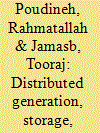| Srl | Item |
| 1 |
ID:
128352


|
|
|
|
|
| Publication |
2014.
|
| Summary/Abstract |
The need for investment in capital intensive electricity networks is on the rise in many countries. A major advantage of distributed resources is their potential for deferring investments in distribution network capacity. However, utilizing the full benefits of these resources requires addressing several technical, economic and regulatory challenges. A significant barrier pertains to the lack of an efficient market mechanism that enables this concept and also is consistent with business model of distribution companies under an unbundled power sector paradigm. This paper proposes a market-oriented approach termed as "contract for deferral scheme" (CDS). The scheme outlines how an economically efficient portfolio of distributed generation, storage, demand response and energy efficiency can be integrated as network resources to reduce the need for grid capacity and defer demand driven network investments.
|
|
|
|
|
|
|
|
|
|
|
|
|
|
|
|
| 2 |
ID:
094240


|
|
|
|
|
| Publication |
2010.
|
| Summary/Abstract |
The purpose of this paper is to examine the lessons from the recent history of telecoms deregulation for electricity (and by implication heat) network regulation. We do this in the context of Ofgem's RPI-X@20 Review of energy regulation in the UK, which considers whether RPI-X-based price regulation is fit for purpose after over 20 years of operation in energy networks. We examine the deregulation of fixed line telecoms in the UK and the lessons which it seems to suggest. We then apply the lessons to electricity networks in the context of a possible increase in distributed generation directly connected to local distribution networks. We conclude that there is the possibility of more parallels over time and suggest several implications of this for the regulation of electricity and heat networks.
|
|
|
|
|
|
|
|
|
|
|
|
|
|
|
|
| 3 |
ID:
088955


|
|
|
|
|
| Publication |
2009.
|
| Summary/Abstract |
The amount of decentralised electricity generation (DG) connected to distribution networks increases across EU member states. This increasing penetration of DG units poses potential costs and benefits for distribution system operators (DSOs). These DSOs are regulated since the business of electricity distribution is considered to be a natural monopoly. This paper identifies the impact of increasing DG penetration on the DSO business under varying parameters (network characteristics, DG technologies, network management type) and argues that current distribution network regulation needs to be improved in order for DSOs to continue to facilitate the integration of DG in the network. Several possible adaptations are analysed.
|
|
|
|
|
|
|
|
|
|
|
|
|
|
|
|
| 4 |
ID:
110747


|
|
|
|
|
| Publication |
2011.
|
| Summary/Abstract |
Similar to other European countries, mechanisms for the promotion of electricity generation from renewable energy sources (RESs) and combined heat and power (CHP) production have caused a significant growth in distributed generation (DG) in Spain. Low DG/RES penetration levels do not have a major impact on electricity systems. However, several problems arise as DG shares increase. Smarter distribution grids are deemed necessary to facilitate DG/RES integration. This involves modifying the way distribution networks are currently planned and operated. Furthermore, DG and demand should also adopt a more active role. This paper reviews the current situation of DG/RES in Spain including penetration rates, support payments for DG/RES, level of market integration, economic regulation of Distribution System Operators (DSOs), smart metering implementation, grid operation and planning, and incentives for DSO innovation. This paper identifies several improvements that could be made to the treatment of DG/RES. Key aspects of an efficient DG/RES integration are identified and several regulatory changes specific to the Spanish situation are recommended.
|
|
|
|
|
|
|
|
|
|
|
|
|
|
|
|
| 5 |
ID:
166441


|
|
|
|
|
| Summary/Abstract |
Offshore wind power development is expected to play an important role in meeting the EU climate targets. To integrate offshore wind power, advanced offshore infrastructures such as meshed grids are suggested to optimise the grid development. Meshed offshore grids refer to integrated offshore infrastructure where offshore wind power hubs are interconnected to several countries as opposed to radial connection linking the wind farm to one single country and market. However, development of meshed architectures is hindered by the legal and regulatory barriers.
|
|
|
|
|
|
|
|
|
|
|
|
|
|
|
|